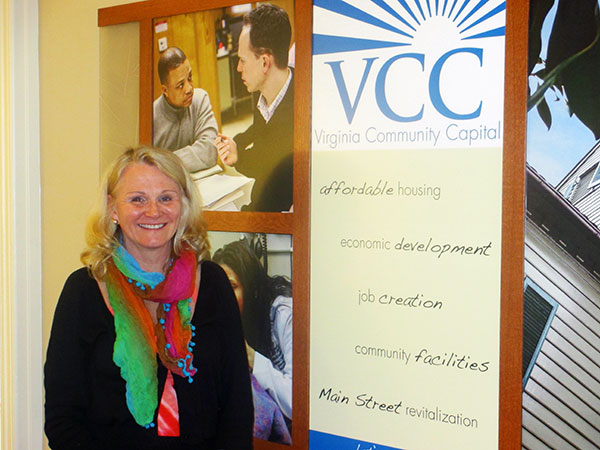An area nonprofit with a distinctive banking business model has a new product for investors who have a taste for do-gooding.
Virginia Community Capital, which has an office downtown at 100 W. Franklin St., in November began offering Local Impact Opportunity Notes (LION notes). The investment product offers a small financial return – below market rate – but seeks to create social return by funding certain types of projects across the state.
For example, the projects LION notes fund might create affordable housing or community facilities, renovate a blighted building for mixed use, or help a small business create jobs, said Teri Lovelace, VCC’s vice president of community investments and impact.
“Impact investing is a concept taking hold throughout the country.” Lovelace said.
The purchasers of LION notes are investing in VCC, which matches the money with projects. The borrower pays back the money and interest to VCC, which then pays the investor.
VCC is a nonprofit community development financial institution that owns a for-profit, state-chartered bank known as Community Capital Bank of Virginia. It offers loans that spur economic and community development that traditional banks might find too risky, Lovelace said.
The organization’s local projects include funding the expansion of an excavation company in Goochland County, the renovation of an old ice skating facility into a Riverside PACE facility in Scott’s Addition and the building of lofts on Grace Street.
Buyers of LION notes can specify the area they want their dollars to be used in, if a project is available.
“People who live in Richmond can buy a note, get a return and get their money back, while at the same time funding economic development projects in their community,” Lovelace said.
The notes are offered through private placement and to accredited investors only. An accredited investor is someone with a net worth of more than $1 million or who has an annual income in excess of $200,000, Lovelace said, or could be a trust or a group. The loan is an unsecured debt.
Lovelace anticipates that VCC will sell between $75,000 and $250,000 worth of LION notes by the end of 2013 and between $1 million and $2 million in a year. About $100,000 had been spoken for as of Dec. 23.
Founded in 2005, VCC has $100 million in assets but no shareholders, Lovelace said.
VCC boasts a low default rate on its loans because it counsels its borrowers as part of its mission, she said. This year, for example, it doled out $73 million in loans without a single borrower defaulting.
In addition to its office in downtown Richmond, VCC keeps its home base in Christiansburg and an office in Northern Virginia.
An area nonprofit with a distinctive banking business model has a new product for investors who have a taste for do-gooding.
Virginia Community Capital, which has an office downtown at 100 W. Franklin St., in November began offering Local Impact Opportunity Notes (LION notes). The investment product offers a small financial return – below market rate – but seeks to create social return by funding certain types of projects across the state.
For example, the projects LION notes fund might create affordable housing or community facilities, renovate a blighted building for mixed use, or help a small business create jobs, said Teri Lovelace, VCC’s vice president of community investments and impact.
“Impact investing is a concept taking hold throughout the country.” Lovelace said.
The purchasers of LION notes are investing in VCC, which matches the money with projects. The borrower pays back the money and interest to VCC, which then pays the investor.
VCC is a nonprofit community development financial institution that owns a for-profit, state-chartered bank known as Community Capital Bank of Virginia. It offers loans that spur economic and community development that traditional banks might find too risky, Lovelace said.
The organization’s local projects include funding the expansion of an excavation company in Goochland County, the renovation of an old ice skating facility into a Riverside PACE facility in Scott’s Addition and the building of lofts on Grace Street.
Buyers of LION notes can specify the area they want their dollars to be used in, if a project is available.
“People who live in Richmond can buy a note, get a return and get their money back, while at the same time funding economic development projects in their community,” Lovelace said.
The notes are offered through private placement and to accredited investors only. An accredited investor is someone with a net worth of more than $1 million or who has an annual income in excess of $200,000, Lovelace said, or could be a trust or a group. The loan is an unsecured debt.
Lovelace anticipates that VCC will sell between $75,000 and $250,000 worth of LION notes by the end of 2013 and between $1 million and $2 million in a year. About $100,000 had been spoken for as of Dec. 23.
Founded in 2005, VCC has $100 million in assets but no shareholders, Lovelace said.
VCC boasts a low default rate on its loans because it counsels its borrowers as part of its mission, she said. This year, for example, it doled out $73 million in loans without a single borrower defaulting.
In addition to its office in downtown Richmond, VCC keeps its home base in Christiansburg and an office in Northern Virginia.




Very proud to be part of this organization and their mission to help build wealth in underserved VA communities!